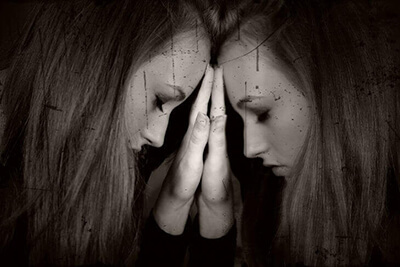Co-Occurring Disorders

Co-occurring disorders are often found in individuals suffering from addiction. As both disorders will require treatment, if you are an addict, it is important for you to be screened for any co-occurring disorders and that these issues are discovered as soon as possible. While it can be difficult to recover if you are dealing with two interacting disorders, treatment can help you make a change and start living a safer, happier life. Get help today by calling us.
What are Co-occurring Disorders?
 Co-occurring disorders are two or more disorders or illnesses that occur in the same individual and are active at the same time. This term also implies that the two issues are connected and have the ability to worsen one another. Other terms for the same condition include comorbidity and dual diagnosis.
Co-occurring disorders are two or more disorders or illnesses that occur in the same individual and are active at the same time. This term also implies that the two issues are connected and have the ability to worsen one another. Other terms for the same condition include comorbidity and dual diagnosis.
The most common co-occurring disorders associated with addiction are mental health problems and illnesses. These can include mood disorders like depression and anxiety disorders (such as generalized anxiety, phobia, social anxiety, etc.) or mental illnesses like schizophrenia. Addiction is scientifically classified as a mental illness because of the changes it makes to the brain and because it is hard for a person to overcome without treatment. When a person suffers from two mental disorders occurring at the same time, it is necessary for them to seek treatment right away.
For assistance finding a treatment program, call us.
Which Mental Disorders Commonly Occur With Addiction?
Depression, bipolar disorder, anxiety disorders, eating disorders, post-traumatic stress disorder (or PTSD), schizophrenia, and obsessive-compulsive disorder (OCD) can all occur along with addiction. These are some of the most common conditions found in those who abuse drugs in dangerous amounts. While there are many other conditions that can occur simultaneously with addiction, these are the ones most commonly found to occur with serious drug abuse and screened for in rehab centers for addiction.
When a person arrives in a hospital or treatment center for drug intoxication or overdose, medical professionals often check to see if they are suffering from other mental issues by asking them a series of questions about their behavior and their feelings. It can be hard to accept there is a possibility that you may have another mental disorder occurring along with your addiction, but by finding out early and beginning treatment right away, you can avoid many further issues that could be caused by either condition.
How Common is Comorbidity?
Co-occurring disorders, especially those associated with addiction and a mental disorder, are extremely common. According to the National Institute on Drug Abuse, “Compared with the general population, people addicted to drugs are roughly twice as likely to suffer from mood and anxiety disorders, with the reverse also true.” There are also a number of reasons why these issues occur so often together in the same individual.
- People suffering from mental illnesses or disorders often attempt to cope with their symptoms by abusing drugs. They attempt to medicate themselves so they no longer experience these issues; however, this can be extremely damaging and, even when prescription drug abuse is involved, lead to addiction.
- The same parts of the brain associated with and altered by addiction are often associated with other mental illnesses as well. In fact, a person who has both conditions will usually display abnormalities in the same regions of the brain that are also affected by their addictions.
- Abusing drugs can cause the symptoms of a person's mental disorder to flare up. For example, individuals who abuse marijuana often and in high doses have an increased risk of psychotic symptoms, which is a product of their drug abuse’s effect on their latent mental illness.
- Substance abuse also leads to mental illness in other cases. Opioid and cocaine abuse can both cause depression, and other addiction syndromes can lead to serious mental health problems that require treatment, no matter how long they last. The psychosis caused by stimulant abuse will usually subside after an individual receives treatment and stops abusing the drug, but this can cause the individual to require long-term therapy afterwards.
- Someone who is genetically predisposed to either addiction or mental illness will be more likely to experience both in their lifetime.
- Issues like trauma and stress are common causes of both types of disorders.
- Both conditions are developmental, which means they can often occur in the early stages of someone’s life. Teenagers are highly susceptible to both addiction and mental health issues, even though a person at any age could experience either. It is also important that those adolescents who do suffer from one are screened for and prevented from experiencing issues with the other.
Dual diagnoses of these types are extremely common, and this is why it is so highly necessary that treatment is available for both issues. Call us today to find treatment options available in your area.
How are People with Co-occurring Disorders Treated?
If you have more than one mental illness as an addict, it is important that you are treated for both issues simultaneously. This can seem overwhelming at first, but it is absolutely necessary for a safe recovery.
- People who are diagnosed with both addiction and a mental illness and who aren't treated for the latter issue often relapse. This is because the disorder that has not been treated can erode the treatment process and all the progress the individual has made with their addiction. Because both issues are so tightly tied together, it is impossible to treat one successfully without treating the other at the same time.
- Often, a mental disorder and an addiction cause a number of the same symptoms and other issues. The symptoms caused by depression are similar to those that occur when a person goes through cocaine withdrawal and experiencing these problems in one way can be triggering to the individual’s other condition.
- Continuing to let the mental disorder stay untreated is unsafe for the individual. Even if it seems like a lot to deal with now, it will be much safer in the long run for you to acknowledge all your problems and to begin to make a change.
Treatment also must be done in such a way that neither method exacerbates either condition. Because both issues interact so strongly with one another and the same regions of the brain are often affected by both types of disorders, any treatment method used to treat one problem must not cause severe side effects associated with the other. The treatments themselves that are being used for both conditions must also not interact poorly with one another. It is a delicate balance for doctors to find a treatment plan that works for both disorders, but patients always require an individualized program for addiction. You will need to be treated safely and effectively for both conditions simultaneously, usually in a combination of two ways.
- Medication: Many medications are used safely in the treatment of comorbid patients. They must merely be given in such a way that two or more medications do not react badly with one another, as stated above. However, certain drugs can help to recreate the normal functions of the brain and treat withdrawal symptoms as well as symptoms associated with other mental disorders.
- Behavioral therapies: Many behavioral therapies are especially well suited to treating both conditions simultaneously. For example, cognitive-behavioral therapy is often used to treat individuals dealing with “a range of other problems that often co-occur with” drug abuse, according go the NIDA. CBT allows patients to see their drug abuse and their other mental illnesses in a new light that helps them.
- Understand how to cope with stress and other triggering issues in better ways
- See the pros and cons of continued drug abuse
- Anticipate problems that may occur in the future and find solution for them
- Learn to self-monitor so that they can avoid triggers in the future
While co-occurring disorders are meant to be treated simultaneously, there is a strong likelihood that you may struggle more with one than the other at certain times in your life. This is why you should be prepared to attend multiple treatment and rehab programs and to be able to recognize when certain issues begin to flare up again. However, once you begin attending treatment for your dual diagnosis, you can truly start to see how these issues affect one another and how you can more effectively cope with them both.
Do I Really Need Help for Comorbidity?
Absolutely. Having another mental illness or disorder makes it that much harder to stop abusing drugs. Without treatment, people often make excuses for themselves in order to keep using dangerous substances as well as worsen their mental state by giving in to further drug abuse. It usually isn’t recommended that people suffering from addiction stop abusing a substance cold turkey––or without professional treatment––but this can be even more dangerous for someone with dual diagnosis.
- Suicidal thoughts are often the result of an untreated mental disorder during addiction recovery.
- Many individuals relapse back to drug abuse because of their untreated mental illness only to overdose because their tolerances are no longer as high as they once were.
- Those who choose not to attend treatment often struggle with withdrawal symptoms and other issues that are much easier to endure with regular pharmacological and therapeutic treatment.
Seek Help for Your Co-occurring Disorders Now
If you believe you are suffering from drug addiction and more than one mental disorder or illness, call us. We will help you find a treatment center that caters to your needs in the city of your choice. With our help, you can locate a program that will treat both of your conditions simultaneously and allow you to start to heal. In addition, we can answer any questions you may have about addiction, mental health, and dual diagnosis. Call us today.




